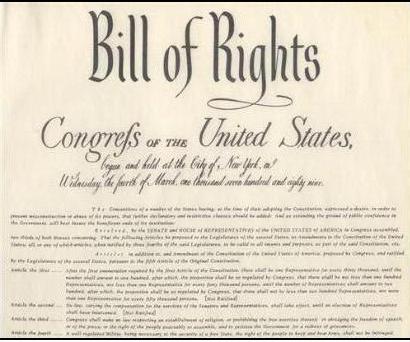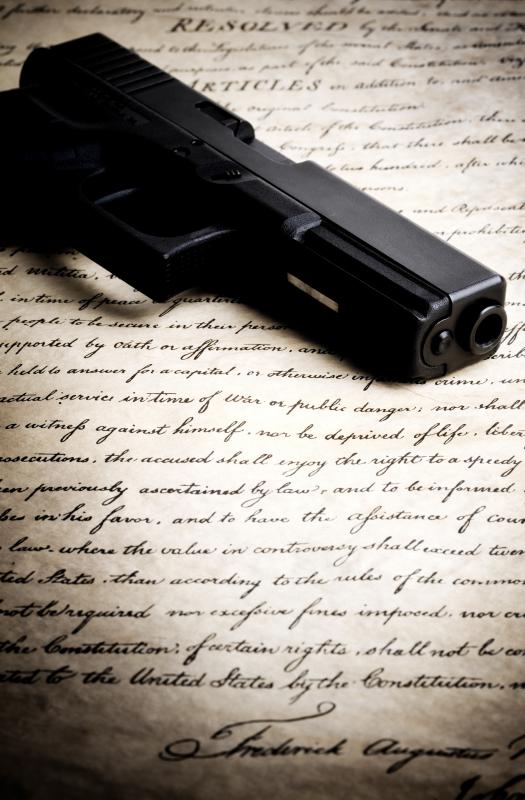At WiseGEEK, we're committed to delivering accurate, trustworthy information. Our expert-authored content is rigorously fact-checked and sourced from credible authorities. Discover how we uphold the highest standards in providing you with reliable knowledge.
What are Constitutional Rights?
Constitutional rights are fairly easily defined though they don’t exist for all people and may not be the same in different areas of the world. These rights are those guaranteed to people and explicitly stated in a government's constitution, which sets forth laws of the region. There are many countries that have implicit constitutional rights instead, but some countries make a statement of rights to which citizens and possibly others in the country are entitled.
A familiar example of constitutional rights is the United States of America's constitution, which devotes its first ten amendments to explicitly defining the rights of its people. The US constitution later was enhanced by the addition of amendments that expand certain rights. These include the right for more people to vote or amendments that protect people from undue discrimination by the government or others due to things such as race or gender.
The basic constitutional rights afforded people in the first ten amendments or the Bill of Rights include the right to an expedient trial and deliberation by a jury of peers. They exclude illegal search and seizure of property.

People in the US have the ability to exercise free speech, free press, free choice of religion, and they have right to bear arms. Other rights like the right not to self incriminate and to freely assemble exist too. Provided the constitution remains unchanged, the right to any of these things is guaranteed by law, with some exceptions, which are now more limited than was once true.

The way person or citizen is defined has changed over time. Women, slaves and Native Americans lacked full constitutional rights for many years. The extent to which constitutional rights have an impact depends on the group of population defined as citizens. If this a small group, then it really doesn’t matter how expansive and liberal a constitution seems in granting rights. A constitution could be a document of extraordinary discrimination despite appearing to offer a lot of rights to “citizens” or another defined group.

People might also lose rights granted by a constitution, under some circumstances. This could occur if they commit crimes of a certain nature. Again, it all depends on how a constitution defines “persons” who are allowed rights. Similarly, rights are usually granted only to citizens, but they might also apply to legal residents or visitors.
In essence, the way a state defines persons determines who has protected, stated rights under the law, and each country could determine exactly what constitutional rights exist for its defined set of “persons.” Many of these rights are the same and there also may be a sense of human rights that underlies any specific documents suggesting constitutional rights. Not all governments explicitly set forth a series of rights in a constitution, but there can be implicit understanding that citizenry or anyone in a country is entitled to certain things.
AS FEATURED ON:
AS FEATURED ON:















Discussion Comments
@Moldova - On top of too many people losing sight of these rights, I also feel that people miss important details on what Congress and the people / states can do.
First, there's the First Amendment that starts with "Congress shall make no law...", which means that we the people of the U.S. have our rights to free speech/liberty protected from Congress' laws.
However, the 10th Amendment also states:
"The powers not delegated to the U.S by the Constitution, nor prohibited by it to the States, are reserved to the States respectively, or to the people."
This means that, as is, the right to deprive someone of liberty and free speech is possible through State law and/or the people of the U.S. wherein they reside.
However, this also leads to a statement within Section 1 of the 14th Amendment:
"...No State shall make or enforce any law which shall abridge the privileges or immunities of citizens of the U.S; nor shall any State deprive any person of life, liberty, or property, without due process of law; nor deny to any person within its jurisdiction the equal protection of the laws."
This means that the states, nor the people of that state, cannot arbitrarily deprive persons of their freedom/liberties.
So, in short, if we the people (not Congress or the President) feel that the media is falsifying information in some way, we have a right in our States to bring them to court. Also, when the States passed the law to deprive someone the freedom to burn U.S. flags (aka personal property), the Supreme Court should have no say since this was a state issue.
We also have a right to demand term limitations for the members our state elects to Congress. This is because the power of term limits is not given to the U.S, but to the states individually.
This is what you call self governing and what Madison refers to in The Federalist Papers No. 51 about a compound Republic of America.
Apologies if this was long, but I wanted to emphasize that there was more to the Constitution that people may miss when they do not read from the source.
Moldova- I agree with you. The founders of the constitution really had insight to human behavior and what protections were needed to be set in order to maintain a just society.
Great article- I just want to add that the First Amendment is such an important right that too many people lose sight of it.
The right to free speech and press is automatically granted in the United States but not in all countries of the world. Cuba one of the few communist nations still around, limits the press to just one newspaper called the “Granma”.
But the state controlled media does not end there, internet access is prohibited and the television channels only present the government’s point of view.
Dissent is prohibited and many protestors have been jailed given 10-20 sentences for minor disagreements with the government policies. The First Amendment was listed first because of its incredible importance to support a free and open society.
Post your comments